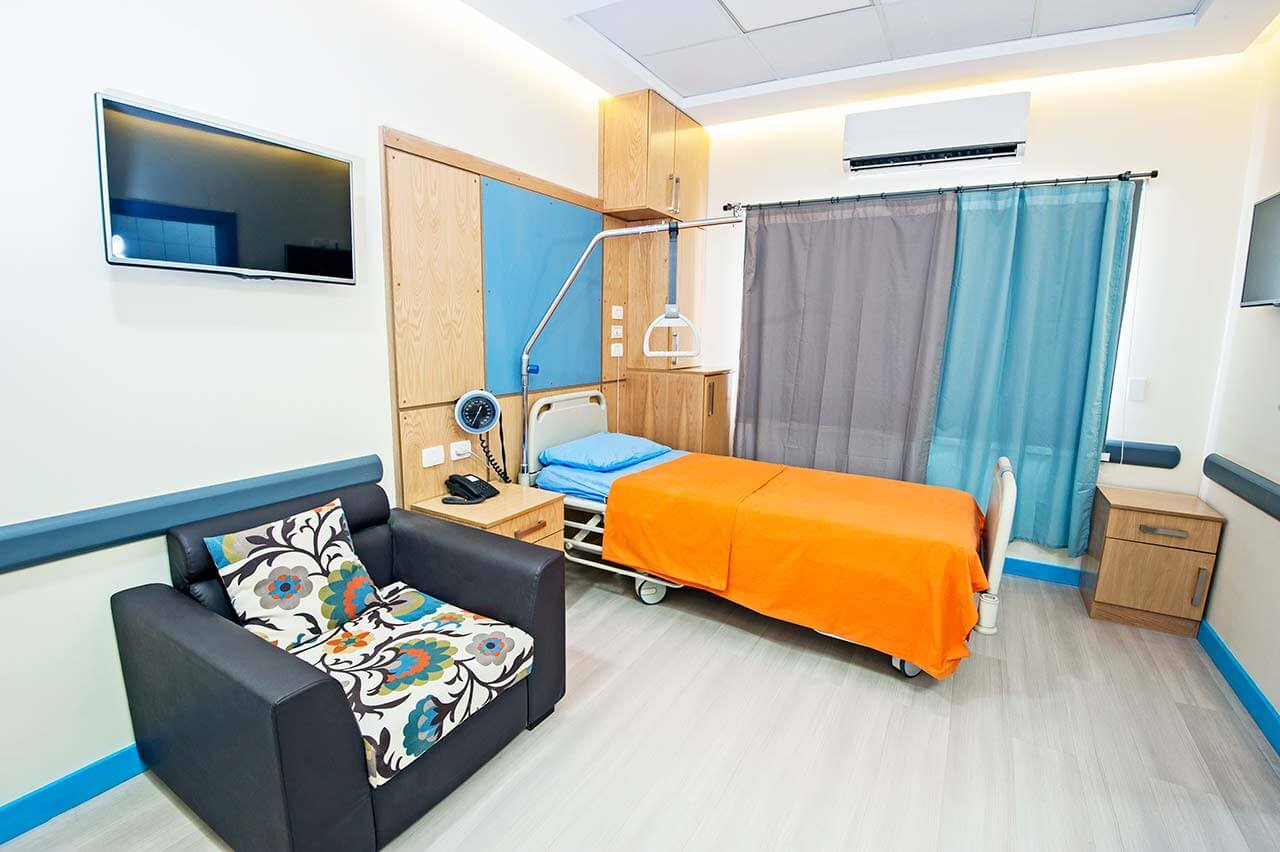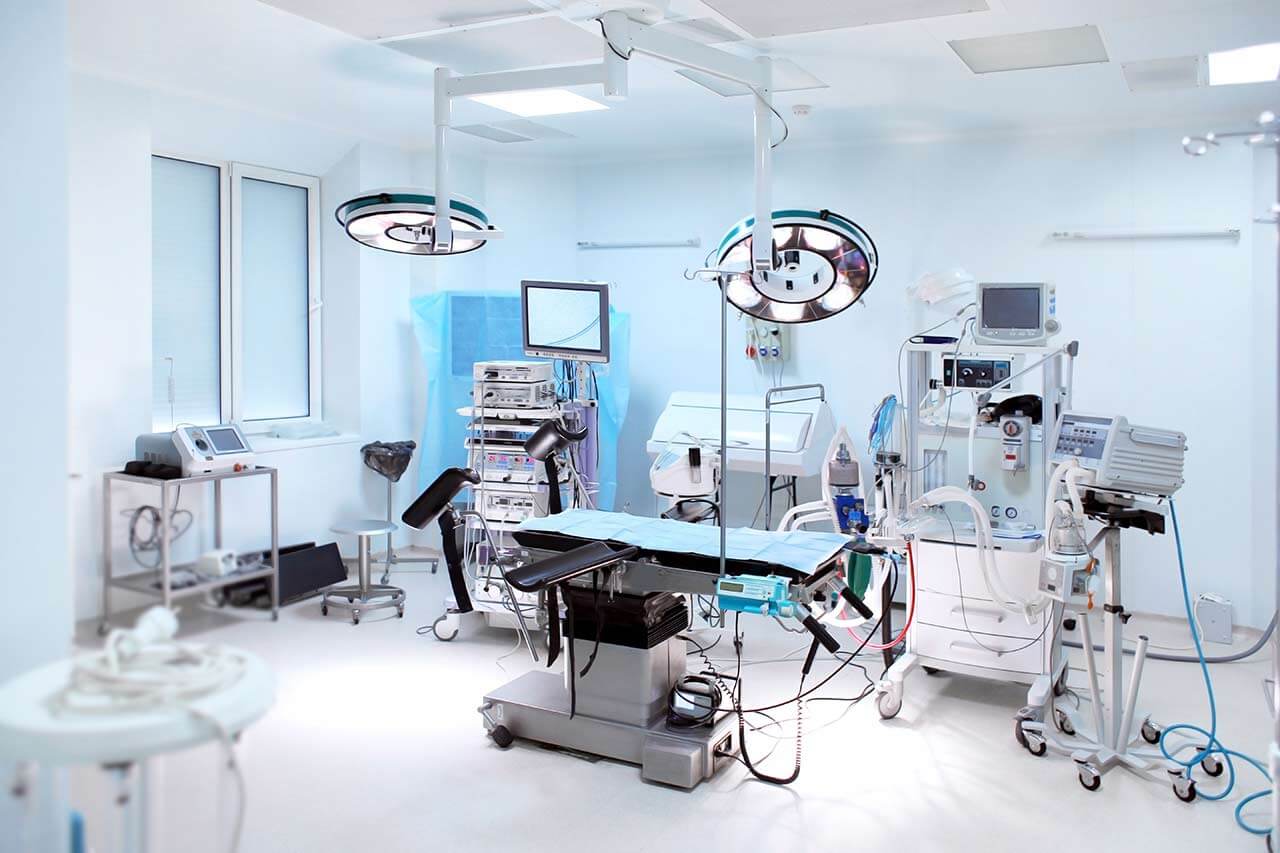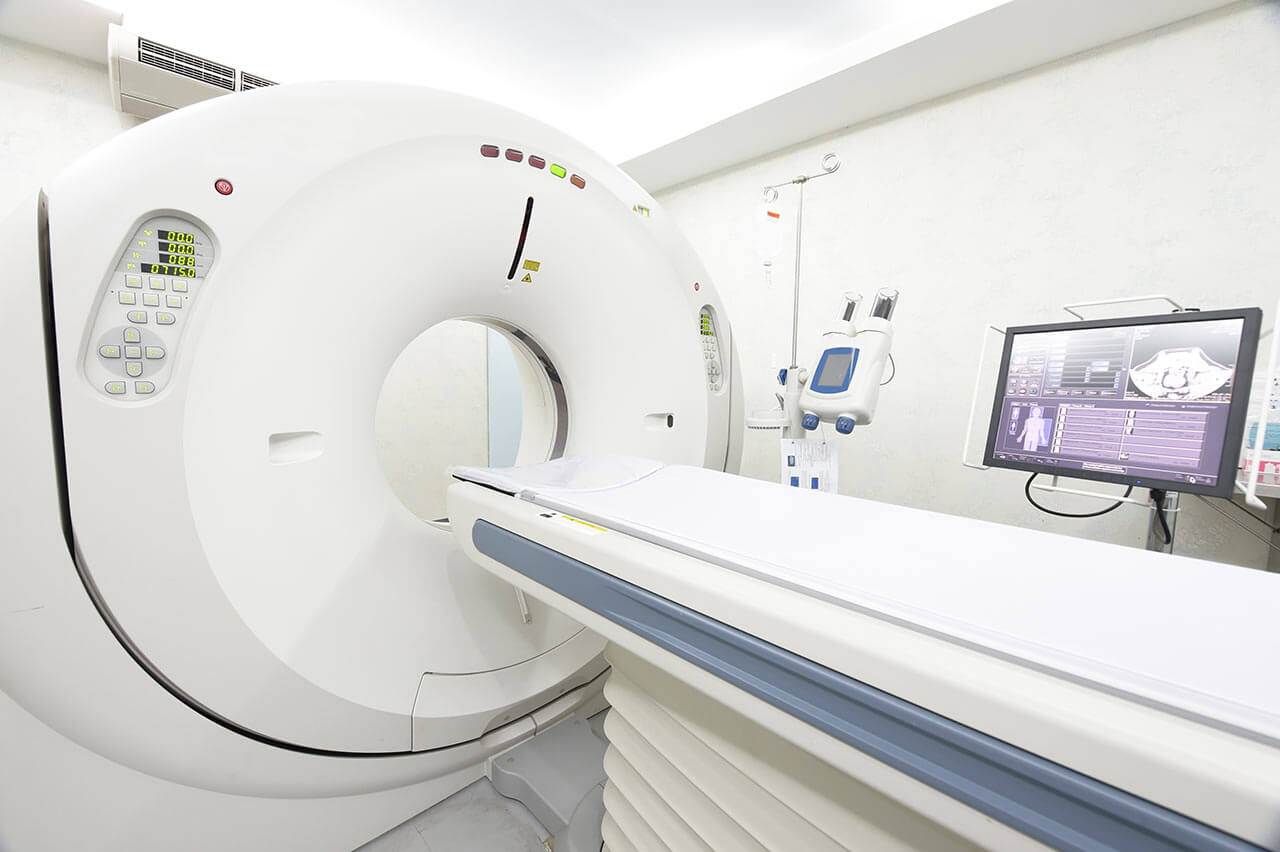
The program includes:
- Initial presentation in the clinic
- clinical history taking
- review of medical records
- physical examination
- laboratory tests:
- complete blood count
- general urine analysis
- biochemical analysis of blood
- TSH-basal, fT3, fT4
- tumor markers
- inflammation indicators (CRP, ESR)
- indicators of blood coagulation
- abdominal ultrasound scan
- CT scan/MRI or PET-CT of abdomen
- preoperative care
- cytoreductive surgery to remove visible tumors
inside the abdomen and HIPEC - histological and immunohistochemical
examination of removed tissues - symptomatic treatment
- cost of essential medicines
- nursing services
- stay in the hospital with a full board
- accommodation in a 2-bedroom ward
- elaboration of further recommendations
How program is carried out
During the first visit, the physician will conduct a clinical examination and go through the results of the available diagnostic tests. After that, you will undergo the necessary additional examination, such as the assessment of liver and kidney function, ultrasound scan and tomography of the abdominal organs. Based on the results of the examination, the physician will choose the surgical technique and the type of anesthesia. After that, preparation according to the preoperative standard will start.
Cytoreductive surgery begins with general anesthesia. The intervention is performed as open surgery, i.e. through the incision in the anterior abdominal wall, so that the surgeon can carefully examine the peritoneum and the surface of the abdominal organs. The surgeon removes affected by the malignant process ovaries, areas of the peritoneum and metastases in other internal organs. This stage of the operation can take several hours, since the overall effectiveness of the treatment depends on the completeness of the malignant tissues removal.
At the next stage of the operation, the surgeon inserts several catheters into the abdominal cavity. Through the catheters, a heated solution of a chemotherapy drug is pumped inside. The special system maintains the required temperature (42-43 degrees Celsius), pressure and circulation rate of the medicinal solution. The solution mechanically flushes out blood clots and remnants of malignant tissues, and a heated chemotherapy drug destroys micrometastases in internal organs and lymph nodes (micrometastases can’t be detected by the naked eye).
After 1-1.5 hours, the chemotherapy drug is removed from the abdominal cavity and the abdominal cavity is washed with saline. After that, the surgeon removes the catheters and sutures the incision of the anterior abdominal wall.
After the completion of the operation, you will be transferred to the ward of the intensive care unit, under the round-the-clock supervision of doctors and nurses. In 1-3 days after the operation, your drains will be removed and you will be transferred to a regular ward for further recovery. The whole treatment takes 10-12 days on average.
Finally, the attending physician will evaluate the results of control examinations, schedule the date of discharge from the hospital and give you detailed recommendations for further follow-up and treatment.
Required documents
- Medical records
- MRI/CT scan (not older than 3 months)
- Biopsy results (if available)
Service
You may also book:
 BookingHealth Price from:
BookingHealth Price from:
About the department
The Department of Adult and Pediatric Gynecology, Mammology, Obstetrics and Reproductive Medicine at the University Hospital Carl Gustav Carus Dresden offers the full range of surgical and conservative treatment of pathologies of the female reproductive system, breast, as well as top-class obstetric services, including management of birth and postnatal care for both mother and baby. The department also has a Center for Reproductive Medicine, where one can undergo comprehensive diagnostics to detect the causes of infertility and use modern assisted reproductive technologies. The department's excellent technical equipment, highly qualified medical staff and the availability of advanced treatment methods allow providing optimal and individualized treatment at the highest level. The treatment of female reproductive cancers is of primary interest to the department's gynecologists. The department also admits girls and young women with congenital anomalies of the genital organs, menstrual disorders, delayed or premature puberty.
The department is headed by Prof. Dr. med. Pauline Wimberger, a highly qualified specialist who has a perfect command of modern methods of treating diseases of the female reproductive system and the mammary gland. In addition, the doctor successfully copes with all issues related to pregnancy and infertility. The doctor's clinical experience, which she has gained in reputable university hospitals in Germany, spans more than 25 years. Prof. Pauline Wimberger pays special attention to research activities, which have resulted in about 200 publications. She is a member of many professional gynecologic organizations, including the German Society of Gynecology and Obstetrics (DGGG) and the European Society of Gynecological Oncology (ESGO).
The department is part of the Comprehensive Cancer Center Dresden, which is one of the 11 highly specialized German Сancer Сenters. Gynecologic and breast cancers are treated within the specialized centers operating on the basis of the department. The department has gained an excellent reputation in these medical fields and is certified by the German Cancer Society. The department offers its patients the full range of diagnostics, surgical treatment (complex oncological interventions, including minimally invasive and robot-assisted surgery), drug therapy, radiation therapy and follow-up monitoring. In addition, the department's tasks include professional psychological care, as well as support of social workers, psychotherapists and specially trained nursing staff.
Another department's important focus is general gynecology, which deals with the treatment of endometriosis and uterine fibroids. The treatment of these pathologies involves the use of sparing minimally invasive techniques, including robot-assisted laparoscopy. The department's doctors also specialize in the diagnostics and treatment of infertility. For this purpose, there is the whole arsenal of effective methods.
In the field of obstetrics, expectant mothers are offered comprehensive pregnancy management, including high-risk pregnancies. The childbirth is carried out by experienced obstetricians who do their best to make it as safe and painless as possible. Various pain management techniques are used to relieve pain during childbirth. These include homeopathy, acupuncture, epidural anesthesia, and relaxation baths. All delivery rooms are equipped with the necessary aids for a successful childbirth.
The department's therapeutic options are complemented by the treatment of infertility in women and men. The department operates a specialized center, whose doctors carry out diagnostics to detect the causes of infertility, and also successfully use assisted reproductive technologies. During the individual consultation, the doctor meets the couple, asks about the period of time during which they cannot conceive a child, and prescribes the necessary diagnostic tests to assess the health status of the partners. With all the diagnostic data, the specialists develop a treatment regimen. In some cases, it is enough to treat a disease that prevents pregnancy, for example, polycystic ovary syndrome or fallopian tube obstruction. However, assisted reproductive technologies are often required: intrauterine insemination, in vitro fertilization and ICSI procedures, TESE/MESA for the administration of sperm into the egg using special micromanipulators. The department also performs cryopreservation of ovarian and sperm cells. Whenever required, psychological assistance is provided.
The department's range of medical services includes:Gynecology
- Diagnostics and treatment of female reproductive cancers
- Surgical treatment
- Extensive surgical interventions
- Minimally invasive surgery
- Operations using the da Vinci surgical system
- Drug therapy
- Chemotherapy
- Hormone therapy
- Antibody therapy
- Targeted therapy
- Radiation therapy, including combined chemoradiation therapy
- Diagnostics and treatment of endometriosis
- Diagnostics and treatment of uterine fibroids
- Diagnostics and treatment of cervical dysplasia
- Diagnostics and treatment of gynecologic disorders in girls
- Premature or delayed puberty
- Menstrual irregularities
- Vaginal discharge of unclear genesis
- Inflammatory vaginal processes
- Labial synechiae
- Developmental disorders and anomalies of the reproductive system in girls
- Suspected sexual abuse
- Diagnostics and treatment of urinary incontinence, including stress incontinence
- Diagnostics and treatment of pelvic organ prolapse in women
- Surgical treatment
- Mammology
- Diagnostics and treatment of breast cancer
- Diagnostics
- Clinical diagnostics with examination and palpation of the breast and lymph nodes
- Ultrasound scanning
- Mammography
- Breast MRI
- Punch biopsy (minimally invasive technique)
- Open diagnostic interventions for tissue sampling for histological examination
- Surgical treatment
- Organ-preserving breast surgery
- Breast resection with its follow-up reconstruction
- Lymphadenectomy
- Systemic therapy
- Chemotherapy
- Antihormone therapy
- Immunotherapy
- Radiation therapy
- Diagnostics
- Diagnostics and treatment of breast cancer
- Reproductive medicine
- Diagnostics and treatment of infertility in women and men
- Diagnostics
- Andrological examination
- Fallopian tube ultrasound (with contrast enhancement)
- Hormone testing
- Laparoscopic diagnostics
- Treatment
- Management of patients with polycystic ovary syndrome
- Intrauterine insemination
- In vitro fertilization
- Ovarian tissue cryopreservation prior to chemotherapy
- Sperm and fertilized oocyte cryopreservation
- Hatching (using laser technology)
- Microsurgery to eliminate fallopian tube obstruction
- Intracytoplasmic sperm injection into the egg (ICSI after TESE/MESA)
- Naturopathy consulting (traditional chinese medicine)
- Embryonic PGD
- Puncture in the natural cycle, IVF/ICSI without ovulation stimulation
- Psychological care
- Special counseling, diagnostics and therapy for repeated spontaneous abortions
- Oocyte vitrification
- Diagnostics
- Diagnostics and treatment of infertility in women and men
- Other diagnostic and therapeutic options
Curriculum vitae
Professional and Clinical Career
- 1992 - 1998 Study of Human Medicine at Ludwig Maximilian University of Munich.
- 1994 - 1999 Doctoral thesis, Institute of Physiology at Ludwig Maximilian University of Munich. Subject: "Comparison of intracellular pH regulation of skeletal muscle cells and resistive vessels in rats with normal blood pressure and spontaneous arterial hypertension using the study of Na+/H+ antiporter activity" (magna cum laude).
- December 1998 - May 2000 Intern, Department of Gynecology, University Hospital Grosshadern, Munich.
- June 2000 Admission to medical practice.
- June 2000 - December 2001 Research Fellow, Department of Gynecology and Obstetrics, University Hospital Campus Grosshadern, Munich, Working Group of PD Dr. med. Rainer Kimmig.
- January 2002 - December 2004 Research Fellow, Department of Obstetrics and Gynecology, University Hospital Essen.
- January 2004 Board certification in Gynecology and Obstetrics.
- Since January 2005 Senior Physician in the Department of Gynecology at the University Hospital Essen.
- Since November 2006 Managing Senior Physician, Gynecologic Oncology, and Head of the Department of Surgical Gynecology at the University Hospital Essen.
- Since 2007 Head of the Outpatient Clinic for Chemotherapy, University Hospital Essen.
- June 2007 Specialization in Gynecologic Oncology.
- October 2007 Habilitation in Gynecology and Obstetrics. Subject: "Assessment of prognostic factors in malignant female genital tumors and immunotherapeutic approaches for the treatment of primary ovarian cancer".
- Since 2008 Managing Senior Physician.
- Since June 2008 Permission for advanced training courses (optional training) in tumor drug therapy.
- Since June 2008 Personal permission for outpatient chemotherapy and tumor drug therapy, Regional Association of Statutory Health Insurance Physicians of North Rhine-Westphalia.
- Since January 2009 Member of the AGO-OVAR Commission.
- Since January 2010 Acting Head of the Department of Gynecology at the University Hospital Essen.
- February 11, 2011 Extraordinary Professor.
- 01.2012 Invitation to the position of W3 Professor of Gynecology and Gynecologic Oncology, Frankfurt am Main (refusal, 04.2012).
- 03.2012 Position of W3 Professor in the Department of Gynecology, Mammology and Obstetrics, Dresden University of Technology.
- Since 01.07.2012 Head of the Department of Adult and Pediatric Gynecology, Mammology, Obstetrics and Reproductive Medicine at the University Hospital Carl Gustav Carus Dresden.
Photo: (с) depositphotos
Sources:
Technische Universität Dresden
About hospital
According to the reputable Focus magazine, the University Hospital Carl Gustav Carus Dresden ranks among the top five German hospitals!
The hospital is the benchmark for modern high-quality medicine. Positioning itself as a maximum care medical facility, the hospital represents all medical fields. There are 26 specialized departments, 6 institutes and 17 interdisciplinary centers, which cooperate closely with the clinical and scientific facilities of the Faculty of Medicine. The basis of successful practice is excellent equipment, which is regularly updated, as well as highly qualified, experienced medical personnel: world famous doctors and professors work here for the benefit of patients.
In addition to its main goal of caring for patients, the hospital is also active in training and professional development of medical personnel, as well as in the field of public health care. The priority focus of the work is research activity, which allows the doctors to introduce the innovative diagnostic and therapeutic techniques into clinical practice.
A special feature of the hospital is also the diagnostics and treatment of rare diseases. State-of-the-art equipment and well-coordinated work of doctors of various medical specialties make it possible to timely recognize pathologies rarely encountered in medical practice and select the most effective therapy. Specialization in rare diseases include neurology, endocrinology, hematology/oncology, and rare autoimmune diseases.
The hospital has 1,410 beds for patient hospitalization. About 55,900 inpatients and more than 233,975 outpatients undergo treatment here annually. A large medical team, consisting of about 1,000 highly qualified doctors, as well as over 2,000 nursing staff take care of the patients' health. Each patient is guaranteed an individual approach and the most effective treatment in accordance with current clinical protocols.
It should be noted that the university hospital enjoys an impeccable reputation not only in Germany, but also far beyond its borders, including Arab countries, post-Soviet states, Great Britain and the United States. Patients from different parts of the world come here for high-quality treatment for diseases of any severity. The highest credit of patient confidence is the main indicator of the fruitful work of doctors.
Photo: (с) depositphotos
Accommodation in hospital
Patients rooms
The patients of the University Hospital Carl Gustav Carus Dresden live in comfortable rooms made in bright colors and equipped with everything necessary. The standard patient room includes an automatically adjustable bed, a bedside table with a sliding table, a wardrobe, a telephone and a TV. There is also Wi-Fi (free) in the patient rooms.
If desired, patients may live in enhanced comfort patient rooms. These patient rooms have a more sophisticated design, upholstered furniture and a safe for storing valuables.
Meals and Menus
The patients of the hospital are offered a tasty, healthy and varied three meals a day. The menu is based on local cuisine and seasonal food. If you for some reason do not eat certain products, please inform the medical staff of the hospital in advance, and you will be offered an individual menu. The nutrition provided in the hospital is certified in accordance with the quality standards of the German Nutrition Society (DGE) for catering in German hospitals.
Further details
Standard rooms include:
Religion
The religious services are available upon request.
Accompanying person
Your accompanying person may stay with you in your patient room or at the hotel of your choice during the inpatient program.
Hotel
You may stay at the hotel of your choice during the outpatient program. Our managers will support you for selecting the best option.
The hospital offers a full range of laboratory diagnostic procedures (general, hormonal, tests for tumor markers, infections, antibodies, etc.), genetic tests, various modifications of ultrasound scans, CT scans, MRI and PET / CT, angiography, myelography, biopsy and other examinations. Treatment with medications, endoscopic and robotic operations, stereotaxic interventions is carried out here, modern types of radiation therapy are also used. The hospital offers patients all the necessary therapeutic techniques.
- Cochlear implantation
- Deep brain stimulation
- Treatment of benign prostatic hyperplasia with green laser
- Da Vinci prostatectomy
- Bone marrow transplantation
These are head and neck tumors, hearloss, amyotrophic lateral sclerosis, epilepsy, Parkinson disease, infertility, malignant tumors of the reproductive system, congenital anomalies of the genital organs and the urinary system, urinary incontinence, blood clotting disorders, leukemia and other pathologies.
- Otolaryngology (Center for Cochlear Implantation)
- Neurology and Epileptology
- Urology
- Oncology
- Gastroenterology and Hepatology
About 1,000 highly qualified doctors work at the hospital.





